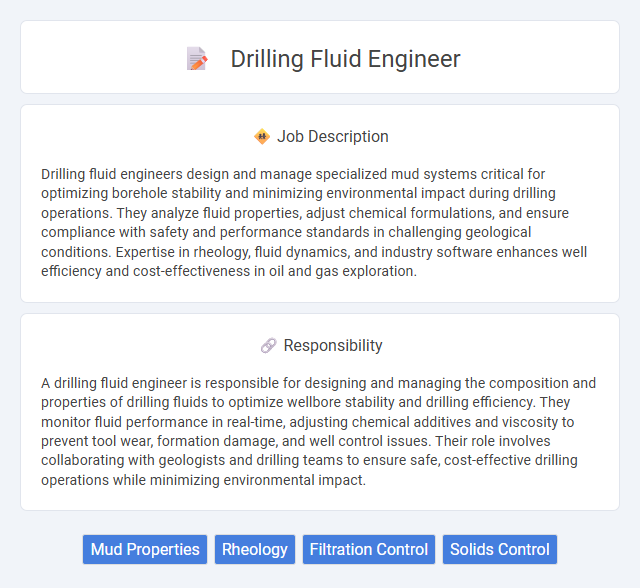
Drilling fluid engineers design and manage specialized mud systems critical for optimizing borehole stability and minimizing environmental impact during drilling operations. They analyze fluid properties, adjust chemical formulations, and ensure compliance with safety and performance standards in challenging geological conditions. Expertise in rheology, fluid dynamics, and industry software enhances well efficiency and cost-effectiveness in oil and gas exploration.
Individuals with a strong background in engineering, problem-solving skills, and resilience to work in challenging environments are likely suitable for the drilling fluid engineer role. Those comfortable with hands-on fieldwork, long hours, and adapting to varying conditions may find the job fulfilling. Conversely, people who prefer stable office settings or have difficulty managing stress might struggle in this profession.
Qualification
A Drilling Fluid Engineer requires a degree in petroleum engineering, chemical engineering, or a related field, combined with specialized training in drilling fluid systems and technologies. Proficiency in fluid dynamics, rheology, and chemical properties of drilling mud is essential for optimizing drilling performance and wellbore stability. Certification from recognized industry bodies such as the Society of Petroleum Engineers (SPE) enhances credibility and career advancement opportunities.
Responsibility
A drilling fluid engineer is responsible for designing and managing the composition and properties of drilling fluids to optimize wellbore stability and drilling efficiency. They monitor fluid performance in real-time, adjusting chemical additives and viscosity to prevent tool wear, formation damage, and well control issues. Their role involves collaborating with geologists and drilling teams to ensure safe, cost-effective drilling operations while minimizing environmental impact.
Benefit
A Drilling Fluid Engineer likely benefits from competitive salaries and opportunities for career advancement within the oil and gas industry. They may experience skill development in fluid technology and wellbore stability, enhancing their technical expertise. Job stability and travel opportunities to various drilling sites could also be potential advantages.
Challenge
Drilling fluid engineers likely face complex challenges managing the properties of drilling fluids to ensure wellbore stability and optimize drilling efficiency. They probably encounter difficulties in formulating fluids that adapt to varying geological formations and extreme downhole conditions. The role often requires problem-solving under pressure to prevent costly delays or equipment failures during drilling operations.
Career Advancement
Drilling fluid engineers play a critical role in designing and managing fluids used in oil and gas drilling operations to optimize wellbore stability and drilling efficiency. Career advancement in this field typically involves progressing from entry-level fluid engineer roles to senior engineer, technical specialist, and management positions in oilfield service companies or exploration firms. Gaining expertise in fluid chemistry, real-time data analysis, and project management significantly enhances prospects for leadership roles and consulting opportunities within the petroleum industry.
Key Terms
Mud Properties
Drilling fluid engineers specialize in optimizing mud properties to enhance drilling efficiency and wellbore stability in oil and gas operations. They analyze parameters such as viscosity, density, pH, and filtration loss to tailor drilling fluids that prevent formation damage and control formation pressures. Expertise in rheology and chemical composition ensures mud systems effectively transport cuttings, maintain wellbore integrity, and minimize environmental impact.
Rheology
A Drilling Fluid Engineer specializes in analyzing and optimizing the rheological properties of drilling fluids to ensure efficient drilling operations and wellbore stability. Mastery of fluid viscosity, yield point, and gel strength is essential for maintaining proper particle suspension and pressure control in various downhole conditions. Expertise in rheology enables the engineer to customize fluid formulations that reduce torque and drag, mitigate formation damage, and enhance overall drilling performance.
Filtration Control
Drilling fluid engineers specializing in filtration control optimize the properties of drilling fluids to minimize fluid loss into porous formations and maintain wellbore stability. They design and test filtration additives that create low-permeability filter cakes, preventing formation damage and ensuring efficient cuttings transport. Mastery of filtration rate analysis and filter cake quality assessment is critical to enhancing drilling performance and reducing non-productive time.
Solids Control
A Drilling Fluid Engineer specializing in solids control manages the composition and properties of drilling fluids to optimize cuttings removal and maintain wellbore stability. Expertise in the operation and maintenance of solids control equipment such as shale shakers, desanders, and centrifuges ensures efficient separation of drill cuttings from the drilling mud. This role is critical for minimizing environmental impact, reducing drilling costs, and enhancing overall drilling performance.
 kuljobs.com
kuljobs.com